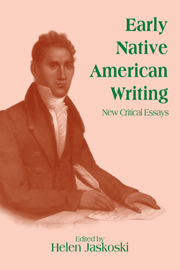Book contents
- Frontmatter
- Contents
- Foreword
- Preface
- List of Contributors
- 1 “Honoratissimi benefactores” Native American students and two seventeenth-century texts in the university tradition
- 2 “Pray Sir, consider a little”: Rituals of subordination and strategies of resistance in the letters of Hezekiah Calvin and David Fowler to Eleazar Wheelock
- 3 “(I speak like a fool but I am constrained)”: Samson Occom's Short Narrative and economies of the racial self
- 4 “Where, then, shall we place the hero of the wilderness?”: William Apess's Eulogy on King Philip and doctrines of racial destiny
- 5 “They ought to enjoy the home of their fathers”: The treaty of 1838, Seneca intellectuals, and literary genesis
- 6 “I am Joaquin!”: Space and freedom in Yellow Bird's The Life and Adventures of Joaquin Murieta, the Celebrated California Bandit
- 7 “This voluminous unwritten book of ours”: Early Native American writers and the oral tradition
- 8 “A terrible sickness among them”: Smallpox and stories of the frontier
- 9 “A desirable citizen, a practical business man”: G. W. Grayson – Creek mixed blood, nationalist, and autobiographer
- 10 “An Indian … An American”: Ethnicity, assimilation, and balance in Charles Eastman's From the Deep Woods to Civilization
- 11 “Overcoming all obstacles”: The assimilation debate in Native American women's journalism of the Dawes era
- 12 “My people … my kind”: Mourning Dove's Cogewea, The Half-Blood as a narrative of mixed descent
- 13 “Because I understand the storytelling art”: The evolution of D'Arcy McNickle's The Surrounded
3 - “(I speak like a fool but I am constrained)”: Samson Occom's Short Narrative and economies of the racial self
Published online by Cambridge University Press: 20 February 2010
- Frontmatter
- Contents
- Foreword
- Preface
- List of Contributors
- 1 “Honoratissimi benefactores” Native American students and two seventeenth-century texts in the university tradition
- 2 “Pray Sir, consider a little”: Rituals of subordination and strategies of resistance in the letters of Hezekiah Calvin and David Fowler to Eleazar Wheelock
- 3 “(I speak like a fool but I am constrained)”: Samson Occom's Short Narrative and economies of the racial self
- 4 “Where, then, shall we place the hero of the wilderness?”: William Apess's Eulogy on King Philip and doctrines of racial destiny
- 5 “They ought to enjoy the home of their fathers”: The treaty of 1838, Seneca intellectuals, and literary genesis
- 6 “I am Joaquin!”: Space and freedom in Yellow Bird's The Life and Adventures of Joaquin Murieta, the Celebrated California Bandit
- 7 “This voluminous unwritten book of ours”: Early Native American writers and the oral tradition
- 8 “A terrible sickness among them”: Smallpox and stories of the frontier
- 9 “A desirable citizen, a practical business man”: G. W. Grayson – Creek mixed blood, nationalist, and autobiographer
- 10 “An Indian … An American”: Ethnicity, assimilation, and balance in Charles Eastman's From the Deep Woods to Civilization
- 11 “Overcoming all obstacles”: The assimilation debate in Native American women's journalism of the Dawes era
- 12 “My people … my kind”: Mourning Dove's Cogewea, The Half-Blood as a narrative of mixed descent
- 13 “Because I understand the storytelling art”: The evolution of D'Arcy McNickle's The Surrounded
Summary
Samson Occom, Mohegan, Methodist convert, Indian missionary, and founder of Brothertown, is perhaps best remembered for his role in raising the funds that made Dartmouth College's charter possible. His most famous work, “Sermon on the Execution of Moses Paul,” has been paid sporadic attention by scholars of American and American Indian literature. Two Dartmouth biographers have made use of his diaries, though lamenting the sparsity of Occom's entries (e.g., Blodgett 32; see also Love). His hymns have been paid less notice and his autobiographical narratives virtually none. Before the publication of the Heath Anthology of American Literature, few students of American literature had occasion to become familiar with any works by Occom, whose 1768 autobiographical narrative and 1771 sermon on the execution of Moses Paul are reprinted there.
Occom's Short Narrative of My Life consists of some ten manuscript pages from the Dartmouth archives. On its own, but even more particularly in contrast to other early American autobiographical narratives, it suggests the arbitrariness and even violence entailed in early American constructions of subjectivity/self. His text allows us to see how, as Henry Louis Gates, Jr., puts it, “colonialism inscribes itself on the colonized” (469). At the same time, it can help us to question the depoliticized logic of the proprietal self figured positively (even mythically) in figures like Franklin. It traces the unacknowledged connections between the individual, property, colonialism, and “race” in early America's Protestant culture, thus also suggesting avenues for inquiry into how colonialism inscribes itself on the colonizer.
- Type
- Chapter
- Information
- Early Native American WritingNew Critical Essays, pp. 42 - 65Publisher: Cambridge University PressPrint publication year: 1996
- 6
- Cited by

